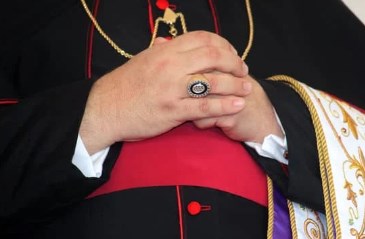
Regarding clergy in general, namely deacons, priests and bishops, the Canon Law of the Catholic Church states in #285:
Can. 285 §1. Clerics are to refrain completely from all those things which are unbecoming to their state, according to the prescripts of particular law.
- 2. Clerics are to avoid those things which, although not unbecoming, are nevertheless foreign to the clerical state.
- 3. Clerics are forbidden to assume public offices which entail a participation in the exercise of civil power.
- 4. Without the permission of their ordinary, they are not to take on the management of goods belonging to lay persons or secular offices which entail an obligation of rendering accounts. They are prohibited from giving surety even with their own goods without consultation with their proper ordinary. They also are to refrain from signing promissory notes, namely, those through which they assume an obligation to make payment on demand.
It is clear from 285.3 that clergy are prohibited from becoming a politician or work for a political party. The spirit of the law here is to provide safeguard against any potential conflict of interests and the abuse of ecclesial powers by political means, and vice versa. Priests should be clearly separated from political encumberment as much as possible and focus on pastoring the spiritual needs of the people.
Many civil laws also specifically prohibit clergy from promoting a particular political candidate or party, as it is prohibited for all charitable organizations. Failure to do so would cause the diocese to lose its charitable status. Clergy however are usually allowed to promote certain values, e.g., pro-life and other moral considerations, in assisting the faithful to discern whom to vote and how to exercise their political freedom and duties.
Historically, however, there have been many examples, even contemporary ones, where priests ignore this law and have become active members of political parties or lobbying groups.
Having said that, priests are certainly free to stand with, and even lead his people in the peaceful exercise of civic rights, including participating in voting, protesting, demonstrating and public speech and debate, insofar it is in the spirit of promoting the spiritual and pastoral well-being of the people and the common good, and is within the scope of Can 285 already discussed above.


